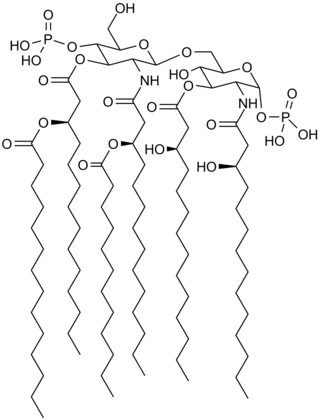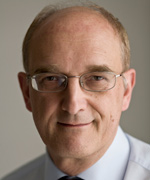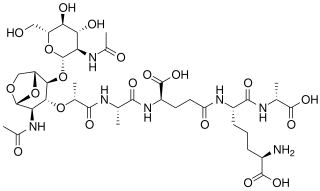
Salmonella is a genus of rod-shaped (bacillus) gram-negative bacteria of the family Enterobacteriaceae. The two known species of Salmonella are Salmonella enterica and Salmonella bongori. S. enterica is the type species and is further divided into six subspecies that include over 2,650 serotypes. Salmonella was named after Daniel Elmer Salmon (1850–1914), an American veterinary surgeon.

Salmonellosis is a symptomatic infection caused by bacteria of the Salmonella type. It is the most common disease to be known as food poisoning, these are defined as diseases, usually either infectious or toxic in nature, caused by agents that enter the body through the ingestion of food. In humans, the most common symptoms are diarrhea, fever, abdominal cramps, and vomiting. Symptoms typically occur between 12 hours and 36 hours after exposure, and last from two to seven days. Occasionally more significant disease can result in dehydration. The old, young, and others with a weakened immune system are more likely to develop severe disease. Specific types of Salmonella can result in typhoid fever or paratyphoid fever. Typhoid fever and paratyphoid fever are specific types of salmonellosis, known collectively as enteric fever, and are, respectively, caused by salmonella typhi & paratyphi bacteria, which are only found in humans. Most commonly, salmonellosis cases arise from salmonella bacteria from animals, and chicken is a major source for these infections.

Lipid A is a lipid component of an endotoxin held responsible for the toxicity of gram-negative bacteria. It is the innermost of the three regions of the lipopolysaccharide (LPS), also called endotoxin molecule, and its hydrophobic nature allows it to anchor the LPS to the outer membrane. While its toxic effects can be damaging, the sensing of lipid A by the immune system may also be critical for the onset of immune responses to gram-negative infection, and for the subsequent successful fight against the infection.

Dame Nancy Jane Rothwell is a British physiologist. She has served as president and vice-chancellor of the University of Manchester since July 2010, having served as Deputy President and Deputy Vice-Chancellor until January 2010.

Bordetella parapertussis is a small Gram-negative bacterium of the genus Bordetella that is adapted to colonise the mammalian respiratory tract. Pertussis caused by B. parapertussis manifests with similar symptoms to B. pertussis-derived disease, but in general tends to be less severe. Immunity derived from B. pertussis does not protect against infection by B. parapertussis, however, because the O-antigen is found only on B. parapertussis. This antigen protects B. parapertussis against antibodies specific to B. pertussis, so the bacteria are free to colonize the host's lungs without being subject to attack by previous antibodies. These findings suggest B. parapertussis evolved in a host population that had already developed immunity to B. pertussis, where being able to evade B. pertussis immunity was an advantage.
The AB5 toxins are six-component protein complexes secreted by certain pathogenic bacteria known to cause human diseases such as cholera, dysentery, and hemolytic–uremic syndrome. One component is known as the A subunit, and the remaining five components are B subunits. All of these toxins share a similar structure and mechanism for entering targeted host cells. The B subunit is responsible for binding to receptors to open up a pathway for the A subunit to enter the cell. The A subunit is then able to use its catalytic machinery to take over the host cell's regular functions.
Dame Jean Olwen Thomas, is a Welsh biochemist, former Master of St Catharine's College, Cambridge, and Chancellor of Swansea University.

Sir Leszek Krzysztof Borysiewicz is a British professor, immunologist and scientific administrator. He served as the 345th Vice-Chancellor of the University of Cambridge, his term of office started on 1 October 2010 and ended on 1 October 2017. Borysiewicz also served as chief executive of the Medical Research Council of the UK from 2007-2010 and was the chairman of Cancer Research UK from 2016 to 2023.

Virulence-related outer membrane proteins, or outer surface proteins (Osp) in some contexts, are expressed in the outer membrane of gram-negative bacteria and are essential to bacterial survival within macrophages and for eukaryotic cell invasion.
Anthony (Tony) Charles Minson, PhD, FMedSci is a British virologist known for his work on the biology of herpesviruses, and a university administrator. He was the Senior Pro-Vice-Chancellor of the University of Cambridge from 2003 to 2009. He is an emeritus professor of virology at the university's Department of Pathology and an emeritus fellow of Wolfson College.
Rauchvirus is a genus of viruses in the order Caudovirales, in the family Podoviridae. Bacteria serve as natural hosts. The genus contains only one species: Bordetella virus BPP1.

Tracheal cytotoxin (TCT) is a 921 dalton glycopeptide released by Bordetella pertussis, Vibrio fischeri, and Neisseria gonorrhoeae. It is a soluble piece of peptidoglycan (PGN) found in the cell wall of all gram-negative bacteria, but only some bacteria species release TCT due to inability to recycle this piece of anhydromuropeptide.

Gordon Dougan is a Professor in the Department of Medicine at the University of Cambridge and head of pathogen research and a member of the board of management at the Wellcome Sanger Institute in Cambridge, United Kingdom. He is also a Fellow of Wolfson College, Cambridge. During his career, Dougan has pioneered work on enteric diseases and been heavily involved in the movement to improve vaccine usage in developing countries. In this regard he was recently voted as one of the top ten most influential people in the vaccine world by people working in the area.

Julian Parkhill is Professor of Bacterial Evolution in the Department of Veterinary Medicine at the University of Cambridge. He previously served as head of pathogen genomics at the Wellcome Sanger Institute.

Mark Achtman FRS is Professor of Bacterial Population Genetics at Warwick Medical School, part of the University of Warwick in the UK.

Andrew Neil James McKenzie is a molecular biologist and group leader in the Medical Research Council (MRC) Laboratory of Molecular Biology (LMB).

Sir Andrew James McMichael, is an immunologist, Professor of Molecular Medicine, and previously Director of the Weatherall Institute of Molecular Medicine at the University of Oxford. He is particularly known for his work on T cell responses to viral infections such as influenza and HIV.
Kathryn "Kat" Elizabeth Holt is an Australian computational biologist specializing in infectious disease genomics. She is a professor at Monash University's Department of Infectious Diseases and a professor of Microbial Systems Genomics at the London School of Hygiene & Tropical Medicine (LSHTM). Her current research focuses on investigating the evolution and dissemination of antimicrobial resistance. In 2015, Holt received the L'Oréal-UNESCO International Rising Talent Award.
Charles Bangham holds the Chair in Immunology at Imperial College London.
Sir Andrew John Pollard is the Ashall Professor of Infection & Immunity at the University of Oxford and a Fellow of St Cross College, Oxford. He is an Honorary Consultant Paediatrician at John Radcliffe Hospital and the Director of the Oxford Vaccine Group. He is the Chief Investigator on the University of Oxford COVID-19 Vaccine trials and has led research on vaccines for many life-threatening infectious diseases including typhoid fever, Neisseria meningitidis, Haemophilus influenzae type b, streptococcus pneumoniae, pertussis, influenza, rabies, and Ebola.












